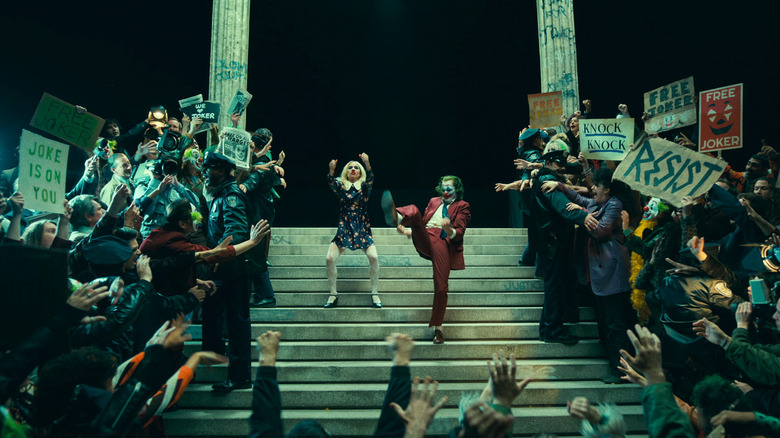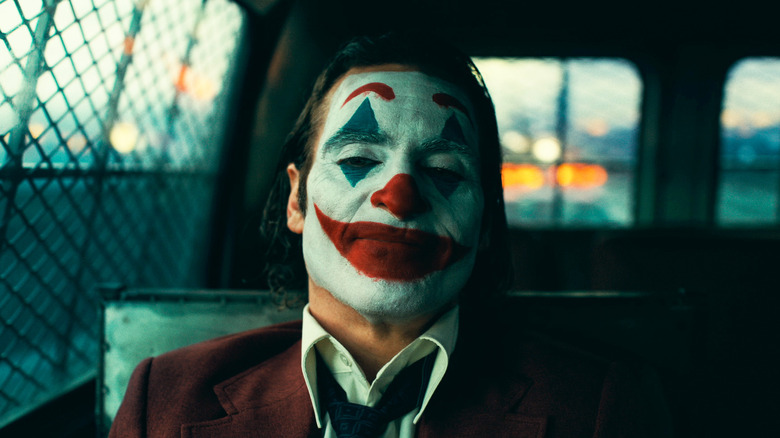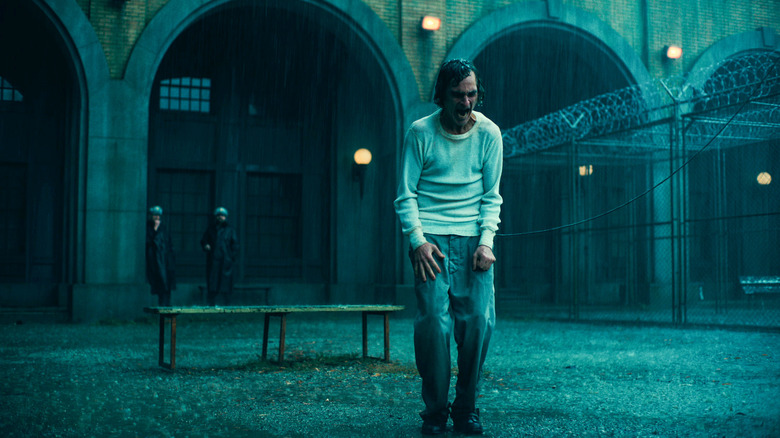Joker 2's Henchmen Are A Big Middle Finger To Hardcore Fanboys
This article contains spoilers for "Joker: Folie à Deux."
Sometime during the 1950s, Groucho Marx made the now famous joke when declining membership to the Friar's Club: "I don't want to belong to any club that will accept me as a member." Not only is the joke a very clever, multi-layered comment that is both self-depreciating and a jab at the institution it's directed at, it's also a quote that everyone would do well to remember in this day and age of what we're calling "stan culture." The term derives from Eminem's 2000 single called "Stan," about a fictional fan of the rapper whose devotion turns from obsessive adoration to threatening violence. The fact that the term has been recently widely accepted as slang for "fan" should tell you all you need to know about the state of fandoms these days; these folks aren't all alright.
That's something director/co-writer Todd Phillips and the rest of the filmmakers behind 2019's "Joker" must've discovered firsthand while making and releasing that movie, which sought to deconstruct the iconic Batman villain from a gritty, Martin Scorsese-inspired, character study perspective. Reactions to the film ranged wildly, from ecstatic praise to vitriolic scorn, with some folks convinced that the film was a new masterpiece while others insisted it was going to incite real-life violence and mayhem. The truth, as always, was somewhere in between, but we no longer live in a world where nuance and "in-between" is good enough; social media ensures that hyperbole is the ruler of the day, and fandoms along with stan culture are the most fervent supporters of that mandate.
As such, "Joker: Folie à Deux," the follow-up to "Joker" dropping five years after the eventful release of the first film, is one big metaphorical response to the brouhaha "Joker" stirred up. Arthur Fleck aka Joker (Joaquin Phoenix) finds himself struggling with his infamous alter ego throughout the film, leading up to a moment which sees him encounter this movie's version of Joker's henchmen, who just so happen to represent a big middle finger to the character's real-life fanboys.
Joker's long look into his own mirror
Toward the end of "Folie à Deux," Arthur has officially declared that "There is no Joker" while on trial for his crimes, effectively burying that persona and inadvertently ending his relationship with Lee (Lady Gaga). Yet the mania that Joker has incited in certain Gotham City denizens ever since his appearance on the Murray Franklin (Robert De Niro) show in the first film has only grown, and shows no signs of stopping. To wit, as Arthur's guilty verdict is being read in court, an explosion rocks the courthouse, and it appears that this bomb wasn't necessarily intended as a sort of prison break, but an act of chaotic terrorism. Nonetheless, Arthur escapes onto the street, and is quickly discovered by a fan of his in Joker makeup. This man insists on helping Arthur away from the court and the authorities, herding him into the back of a car that a buddy of his (also in clown makeup) is driving.
As the trio drive through Gotham in the midst of chaos that the explosion has caused, Arthur is increasingly horrified by the two men's gleeful, amoral behavior, not to mention their worship of and deference to himself. For a man who thought he was raging against the machine of Gotham society and getting justice for the actual wrongs and perceived wrongs that've been done to him, Arthur is shocked to see his chaotic ethos in the hands of such idiotic, untrustworthy folks. Thus, as soon as he's able to exit the back of the car when it's caught in traffic, he does so, leaving his "henchmen" behind and bewildered. On a surface level, this moment is where Arthur first meets his own version of Joker, and does not like anything that he sees.
Arthur faces the horror of cult of personality
The idea that someone can become a public figure whose reputation grows so far beyond them that they no longer recognize either themselves or the persona they initially fostered is far from a new one. It shows up in a variety of satires, everything from "A Face in the Crowd" to "Ferris Bueller's Day Off." The moment in "Folie à Deux" where Joker meets his would-be henchmen is especially reminiscent of the last act of David Fincher's "Fight Club," in which a man initially purporting to be a revolutionary inadvertently finds himself at the pointed end of his own sword (or gun, in that case). As always, truth is stranger than fiction; it's a good bet that some of the people storming the Capitol on January 6, 2021 watched both "Fight Club" and the first "Joker" while not realizing in the moment how foolish and criminal their actions were, in service of a persona that doesn't really exist.
It's too easy to dismiss the people involved in that shameful incident as being wholly distinct from the majority of folks on this planet, however. All of us are susceptible to the cult of personality. We all so badly wish to see ourselves reflected in others that we begin constructing a false version of someone else, and when they fail to live up to that version, some parasocially deviant things can happen. "Folie à Deux" does this in micro with the failed relationship between Arthur and Lee, and in macro with these fanboy henchmen. It's Phillips' way of reminding his audience that loving a character like Joker cannot be an act of blind devotion, and that its sadly possible to adore someone or something for the wrong reasons. "Folie à Deux," as well as the first "Joker," seeks to explore why such a character could come about, what makes him tick, and why he's attractive when he should be repulsive. They're a reminder that interrogating one's idols and examining popular culture should be a constant and questioning process; if and when we ever give ourselves over to unquestioning devotion, especially if it's shared by many, is when true madness can develop.
"Joker: Folie à Deux" is in theaters now.


